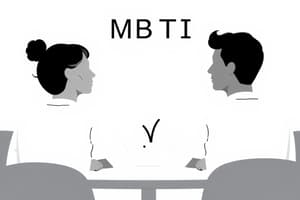Podcast
Questions and Answers
Which MBTI type is characterized by a drive based on original ideas to achieve improvements?
Which MBTI type is characterized by a drive based on original ideas to achieve improvements?
- ENTJ (The Commander)
- INTP (The Logician)
- INTJ (The Architect) (correct)
- ENFP (The Campaigner)
Which MBTI type is most likely to be described as enjoying new ideas and challenges, particularly intellectual ones?
Which MBTI type is most likely to be described as enjoying new ideas and challenges, particularly intellectual ones?
- ENFJ (The Protagonist)
- ENTP (The Debater) (correct)
- INFJ (The Advocate)
- ISTJ (The Logistician)
An individual who is gentle, insightful, dependable, and seeks harmony would most likely be classified as which MBTI type?
An individual who is gentle, insightful, dependable, and seeks harmony would most likely be classified as which MBTI type?
- ENTJ (The Commander)
- ENFP (The Campaigner)
- INFJ (The Advocate) (correct)
- INFP (The Mediator)
Which MBTI type is described as valuing inner harmony, personal growth, and focusing on dreams and possibilities?
Which MBTI type is described as valuing inner harmony, personal growth, and focusing on dreams and possibilities?
An effective organizer, ambitious, and independent person who is also logical could be which MBTI type?
An effective organizer, ambitious, and independent person who is also logical could be which MBTI type?
Which MBTI type is most likely to be described as responsible, sincere, analytical, and realistic?
Which MBTI type is most likely to be described as responsible, sincere, analytical, and realistic?
Which MBTI type would most likely be successful in connecting with people using skilled communication?
Which MBTI type would most likely be successful in connecting with people using skilled communication?
Which MBTI type is enthusiastic, creative, spontaneous, and enjoys starting new projects?
Which MBTI type is enthusiastic, creative, spontaneous, and enjoys starting new projects?
Which personality type is known as 'The Defender'?
Which personality type is known as 'The Defender'?
What is a common characteristic of Antisocial Personality Disorder?
What is a common characteristic of Antisocial Personality Disorder?
During which stage of Erikson's psychosocial development does a child learn to develop independence?
During which stage of Erikson's psychosocial development does a child learn to develop independence?
Which personality type is characterized as 'The Virtuoso'?
Which personality type is characterized as 'The Virtuoso'?
What is a defining trait of the ESFJ personality type?
What is a defining trait of the ESFJ personality type?
In Erikson's stages of development, what is the challenge faced during the Adolescence stage?
In Erikson's stages of development, what is the challenge faced during the Adolescence stage?
Which personality disorder is associated with extreme sensitivity to criticism?
Which personality disorder is associated with extreme sensitivity to criticism?
What developmental challenge occurs during the School Age stage in Erikson's theory?
What developmental challenge occurs during the School Age stage in Erikson's theory?
Which of the following personality types is labeled as 'The Entertainer'?
Which of the following personality types is labeled as 'The Entertainer'?
What is the focus of the Middle Adulthood stage in Erikson's psychosocial development?
What is the focus of the Middle Adulthood stage in Erikson's psychosocial development?
Which personality disorder involves preoccupation with orderliness and perfectionism?
Which personality disorder involves preoccupation with orderliness and perfectionism?
What is one of the key characteristics of the ISFP personality type?
What is one of the key characteristics of the ISFP personality type?
Which developmental stage addresses the conflict of 'Intimacy vs. isolation'?
Which developmental stage addresses the conflict of 'Intimacy vs. isolation'?
What term describes individuals with 'eicentric behavior or beliefs' as part of their personality disorder?
What term describes individuals with 'eicentric behavior or beliefs' as part of their personality disorder?
Flashcards
INTJ
INTJ
Also known as The Architect, INTJs are imaginative and strategic thinkers with a plan for everything.
INTP
INTP
Known as The Logician, INTPs are innovative inventors with an unquenchable thirst for knowledge.
ENTJ
ENTJ
Also called The Commander, ENTJs are bold leaders who are strategic and find ways to get things done.
ENTP
ENTP
Signup and view all the flashcards
INFJ
INFJ
Signup and view all the flashcards
INFP
INFP
Signup and view all the flashcards
ENFJ
ENFJ
Signup and view all the flashcards
ISTJ
ISTJ
Signup and view all the flashcards
Cluster 1 - Personality Disorders
Cluster 1 - Personality Disorders
Signup and view all the flashcards
Antisocial Personality Disorder (ASPD)
Antisocial Personality Disorder (ASPD)
Signup and view all the flashcards
Borderline Personality Disorder (BPD)
Borderline Personality Disorder (BPD)
Signup and view all the flashcards
Avoidant Personality Disorder (AvPD)
Avoidant Personality Disorder (AvPD)
Signup and view all the flashcards
Erikson's Stage - Infancy
Erikson's Stage - Infancy
Signup and view all the flashcards
Erikson's Stage - Adolescence
Erikson's Stage - Adolescence
Signup and view all the flashcards
Erikson's Stage - Young Adulthood
Erikson's Stage - Young Adulthood
Signup and view all the flashcards
Study Notes
Myers-Briggs Type Indicator (MBTI) Types
- INTJ (The Architect): Imaginative and strategic thinkers with a plan for everything. Innovative, independent, strategic, logical, reserved, insightful, driven by original ideas for improvement
- INTP (The Logician): Innovative inventors with a thirst for knowledge. Intellectual, logical, precise, reserved, flexible, imaginative, original thinkers who enjoy speculation and creative problem-solving.
- ENTJ (The Commander): Bold, imaginative, strong-willed leaders who find a way. Strategic, logical, efficient, outgoing, ambitious, independent, effective organizers and long-range planners.
- ENTP (The Debater): Smart and curious thinkers who enjoy intellectual challenges. Inventive, enthusiastic, strategic, enterprising, inquisitive, versatile, enjoy new ideas and challenges, value inspiration.
- INFJ (The Advocate): Quiet, mystical, inspiring, tireless idealists. Idealistic, organized, insightful, dependable, compassionate, gentle, seek harmony and cooperation, enjoy intellectual stimulation.
- INFP (The Mediator): Poetic, kind, altruistic individuals eager to help. Sensitive, creative, idealistic, perceptive, caring, loyal, value inner harmony and personal growth, focus on dreams and possibilities.
- ENFJ (The Protagonist): Charismatic and inspiring leaders who mesmerize. Caring, enthusiastic, idealistic, organized, diplomatic, responsible, skilled communicators who value connection.
- ENFP (The Campaigner): Enthusiastic, creative, sociable free spirits. Enthusiastic, creative, spontaneous, optimistic, supportive, playful, value inspiration, enjoy starting projects, see potential in others.
- ISTJ (The Logistician): Practical and fact-minded individuals; reliable. Responsible, sincere, analytical, reserved, realistic, systematic, hardworking, trustworthy with sound practical judgment.
- ISFJ (The Defender): Dedicated and warm protectors. Warm, considerate, gentle, responsible, pragmatic, thorough, devoted caretakers who enjoy helping others.
- ESTJ (The Executive): Excellent administrators; unsurpassed at managing people. Efficient, outgoing, analytical, systematic, dependable, realistic, like to run the show and get things done in an orderly fashion.
- ESFJ (The Consul): Extraordinarily caring, social, popular individuals eager to help. Friendly, outgoing, reliable, conscientious, organized, practical, seek to be helpful and please others, enjoy being active and productive.
- ISTP (The Virtuoso): Bold and practical experimenters; masters of tools. Action-oriented, logical, analytical, spontaneous, reserved, independent, enjoy adventure, skilled at understanding things.
- ISFP (The Adventurer): Flexible and charming artists; explorers. Gentle, sensitive, nurturing, helpful, flexible, realistic, seek to create a personal environment that is both beautiful and practical.
- ESTP (The Entrepreneur): Smart, energetic, perceptive individuals who enjoy living on the edge. Outgoing, realistic, action-oriented, curious, versatile, spontaneous, pragmatic problem-solvers and skillful negotiators.
- ESFP (The Entertainer): Spontaneous, energetic, enthusiastic entertainers. Playful, enthusiastic, friendly, spontaneous, tactful, flexible, have strong common sense, enjoy helping people tangibly.
Types of Personality Disorders
-
Cluster 1 (Odd, Eccentric):
- Paranoid Personality Disorder (PPD): Persistent distrust and suspicion of others.
- Schizoid Personality Disorder (SzPD): Detachment from social relationships and limited emotional expression.
- Schizotypal Personality Disorder (STPD): Social and interpersonal deficits with eccentric behavior or beliefs; may lead to schizophrenia.
-
Cluster 2 (Dramatic, Emotional):
- Antisocial Personality Disorder (ASPD): Disregard for others' rights and frequent violation of them.
- Borderline Personality Disorder (BPD): Instability in emotions, relationships, and self-image; good/bad extremes; May lead to Bipolarity (manic/depressive).
- Histrionic Personality Disorder (HPD): Excessive attention-seeking and emotionality.
- Narcissistic Personality Disorder (NPD): Grandiosity, need for admiration, lack of empathy; self-centered.
-
Cluster 3 (Anxious, Fearful):
- Avoidant Personality Disorder (AvPD): Extreme sensitivity to criticism and fear of rejection, leading to social avoidance.
- Dependent Personality Disorder (DPD): Excessive reliance on others for emotional and physical needs.
- Obsessive-Compulsive Personality Disorder (OCPD): Preoccupation with orderliness, perfectionism, and control; formalist. May lead to ASD
Erikson's Stages of Psychosocial Development
- Stages focus on social interaction & resolving conflicts
- Each stage builds on the prior one
Infancy (Trust vs. Mistrust)
- Range: 0-18 months
- Relationships: Mother
- Causes of Crying: Hungry, Pain/discomfort, Wet, Sleepy
- Importance: Developing trust from caregiver
Early Childhood (Autonomy vs. Shame & Doubt)
- Range: 18 months-3 years
- Relationships: Parents
- Key Development: Holding on/Letting Go, Independence
Preschool (Initiative vs. Guilt)
- Range: 3-5 years
- Relationships: Playmates
- Development: Solitary play, Parallel play, Cooperative play, Exploring ideas, Trying again
School Age (Industry vs. Inferiority)
- Range: 6-11 years
- Relationships: Teacher
- Development: Self-esteem, self-confidence, Good/Bad behavior
Adolescence (Identity vs. Role Confusion)
- Range: 12-18 years
- Relationships: Friends
- Females: Menarche (first period), Thelarche (breast development)
- Males: Adrenarche (pubic hair growth)
- Body Types: Ectomorph, Mesomorph, Endomorph
- Victim-Rapist Cycle
Young Adulthood (Intimacy vs. Isolation)
- Range: 18-40 years
- Relationships: Partner/significant other
- Body Types: Gyneroid, Android, Platypelloid
- Reasons for C-sections: NSPD, CPD, Cord coil, Breech, Meconium staining, Heart disease
Middle Adulthood (Generativity vs. Stagnation)
- Range: 40-60 years
- Relationships: Partner, children
- Aspects: Career, Marriage, Child-rearing, Mid-life crisis
Maturity (Ego Integrity vs. Despair)
- Range: 60+ years
- Relationships: Grandchildren
Studying That Suits You
Use AI to generate personalized quizzes and flashcards to suit your learning preferences.




